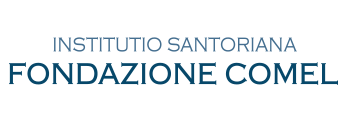L’APPROFONDIMENTO – Summer School in Fondazione, a Pisa
La Fondazione, nell’ambito delle attività scientifiche del proprio CENTRE FOR THE STUDY OF MEDICINE AND THE BODY IN THE RENAISSANCE (CSMBR), ha organizzato, con la collaborazione dell’Università di Exeter, dell’Università di Padova e dello Studio Firmano, e ospiterà nella propria sede pisana nei prossimi giorni di 29-31 marzo un importante evento internazionale dedicato allo studio di alcuni aspetti rilevanti nella storia della medicina.
All’evento, intitolato the Kiln, the Alembic and the Clockwork (oggetto delle indagini sono, di fatto, le prime rappresentazioni moderne del corpo umano svolte dalla nascente scienza medica la cui strada d’accesso fu aperta da Santorio Santorio, il secentesco medico istriano collega di Galileo Galilei che ispirò, tra l’altro, la lunga opera scientifica e professionale di Marcello Comel, l’iniziatore della nostra Institutio Santoriana – Fondazione Comel) partecipano numerosi docenti specializzati fra i più rappresentativi del settore che provengono da numerose e prestigiose sedi universitarie e di studio internazionali e nazionali.
Di seguito pubblichiamo un estratto dei profili professionali degli speakers e il programma dell’evento in parola (Link al programma).
Altre documentazioni nel merito dei lavori e dei rispettivi contenuti, di cui daremo prossima comunicazione, seguiranno l’evento e saranno altresì disponibili nella parte del sito scientifico della Fondazione dedicata al CSMBR.
S P E A K E R S’ S H O R T P R O F I L E S
(Arranged alphabetically)
BALDASSARRI Fabrizio – University of Bucharest
is an intellectual historian investigating the history of early modern ideas, medicine, and botany. In his work, he specifically deals with the French philosopher René Descartes (1596-1650) and his contemporaries; more broadly, he explores the early modern study of plants and medicine from the Renaissance period up to the early eighteenth century. He is currently PI on the project “The Overlooked History of Vegetal Life. From the Vegetative Soul to Metabolism in Early Modern Philosophy and Biomedicine”. For more info, click here.
BIGOTTI Fabrizio – Julius-Maximilians University of Würzburg
is a historian and philosopher of science, with a specialisation in the history of medicine and technology in the early modern period. His work focuses primarily on conceptual history, especially on the interaction between history of science, technology and philosophy with an emphasis on the role that classical and medieval philosophy played in the development of early modern ideas on logic, metaphysics, scientific method, theory of matter, taxonomy, anatomy and physiology. He is the founder and director of the CSMBR, co-editor of the Series ‘Palgrave Studies in Medieval and Early Modern Medicine’ and currently Senior Research Fellow at the Institut für Geschichte der Medizin of the Julius-Maximilians University of Würzburg, working on sixteenth-century anatomy and anatomical method.
BUYSE Filip – University of Oxford
his main academic interests lie in the history of early modern philosophy and the history of science. Filip has a strong background in science as well as in philosophy. His PhD dissertation was on “The Conception of the Body in Spinoza and Galileo”. After awarding a PhD at the Sorbonne, University of Paris, he was awarded fellowships at the Vossius Centre in Amsterdam and the Descartes Centre in Utrecht and in 2017, and he has been visiting HAPP Fellow at the University of Oxford. Currently, he is focusing on publications. Among others, Filip is preparing a volume on a manuscript of Alistair C. Crombie and Adriano Carugo which he has discovered in the Trinity College Archive (Oxford).
GOLDBERG Benjamin – University of South Florida
is currently an Instructor in Humanities and Cultural Studies. His expertise and interests are in science studies broadly construed, including topics at the intersection of early modern philosophy, medicine, and science in Europe, roughly 1600-1800. He is also interested in the history and philosophy of science generally, especially feminist philosophy of science, and the history of philosophy of science (HOPOS). His current work focuses on the role of teleology in William Harvey’s philosophical anatomy.
HIRAI Hiro Radboud UniversityHiro Hirai, Ph.D. (1999) in philosophy and history of science, University of Lille 3 (France), is a Research Fellow at Radboud University (Netherlands). He has published widely in early modern natural philosophy, medicine and alchemy, including Le concept de semences dans les théories de la Renaissance (2005) and Medical Humanism and Natural Philosophy (2011). He also edited Justus Lipsius and Natural Philosophy (2011) and Jacques Gaffarel Between Magic and Science (2014). He is currently preparing his third monograph on Renaissance science and medicine.
NUTTON Vivian – First Moscow Medical State University
is Emeritus Pprofessor of the History of Medicine at UCL as well as Professor at the First Moscow State Medical University. A Fellow of the British Academy and the German Academy of Science, as well as the President of the CSMBR, he has written extensively on all aspects of medicine from the Ancient Greeks to the Renaissance. Among his recent books are Ancient Medicine, revised edition London: Routledge, 2012; Johann Guinter and Andreas Vesalius, Principles of Anatomy according to the Opinion of Galen, London: Routledge, 2017; John Caius, An Autobibliography, London: Routledge, 2018. He is working on a short biography of the Greek physician Galen of Pergamum.
ZAMPIERI Fabio – University of Padua
is Associate Professor at the Unit of Medical Humanities of the University of Padua. He has worked at the Wellcome Trust Centre for the History of Medicine and at the Durham Institute of Advanced Studies, UK. His interests span from the history of ancient and modern medicine to paleopathology and paleopathography. Zampieri has published several books and papers in national and international journals and is recognized as one of the leading experts in the history of Darwinian Theory as referred to the medical practice as well as on Giovanni Battista Morgagni and the history of the anatomo-clinical method.
ZURLINI Fabiola – Studio Firmano for the History of Medicine and Science
received her Ph.D. in History of Education at the University of Macerata in 2012 with a thesis on seventeenth-century medical education. She is Vice-Director and Director in Chief of the Studio Firmano for the History of Medicine and Science (Fermo), as well as Honorary Research Fellow at the Wellcome Trust Centre for the History of Medicine of the University College of London. She collaborates with C.E.S.C.O – University of Macerata. Her research interests and publications include the early modern history of medical libraries and medical bibliography, medical education and the medical profession, with a special focus on medicine at the Roman court of Queen Christina of Sweden. She is currently working on a series of publications dedicated to the physicians Queen Christina’s Court in Rome.



